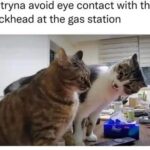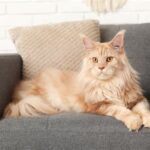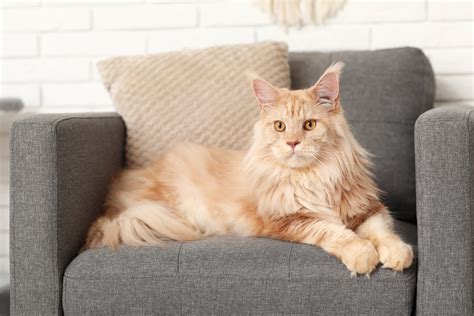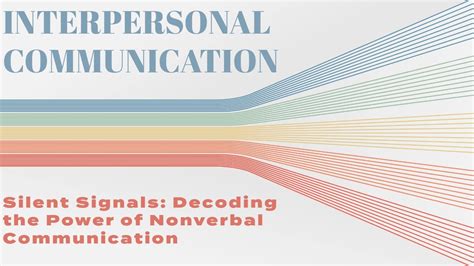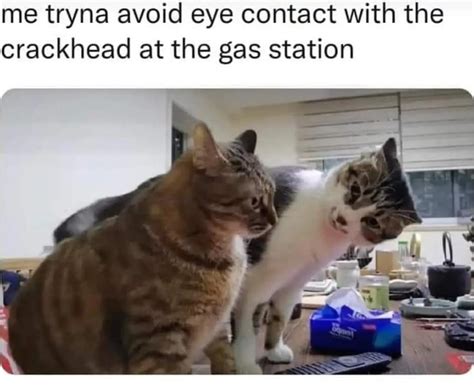
A Maine Coon cat’s overprotective yet comical surveillance tactics of her kittens have captivated the internet, resonating with pet owners familiar with the quirks of feline motherhood. A video showcasing the cat’s intense scrutiny has gone viral, triggering lighthearted reactions and discussions about the relatable aspects of animal behavior.
A video featuring a Maine Coon cat meticulously monitoring her kittens has gone viral, striking a chord with pet owners who recognize the humorous side of animal parenting. The footage, shared widely across social media platforms, depicts the mother cat engaging in what many are calling “hilarious surveillance,” as she keeps a close watch on her offspring, resulting in various amusing facial expressions and postures. This viral sensation has prompted a wave of reactions and anecdotes from viewers, highlighting the universal understanding of parental instincts, even in the animal kingdom.
The clip, originally posted on platforms such as TikTok and X (formerly Twitter), quickly garnered millions of views, likes, and shares. Internet users have been particularly amused by the Maine Coon’s seemingly judgmental gaze and unwavering focus on her kittens’ activities. The video’s caption, “We’ve All Been There!” further solidified its relatability, suggesting that many people can empathize with the trials and tribulations of parenthood, whether human or feline. “It’s like she’s silently critiquing every move they make,” one commenter wrote, capturing the general sentiment surrounding the video.
The appeal of the viral video lies in its ability to tap into the shared human experience of observing parental behaviors, regardless of species. Viewers have noted the mother cat’s intense focus and protective instincts as both humorous and endearing. The Maine Coon breed, known for its large size and gentle demeanor, adds to the video’s charm, contrasting the cat’s imposing physical presence with her seemingly overbearing parenting style. Animal behaviorists suggest that such surveillance is a natural instinct for mother cats, who are hardwired to protect their vulnerable offspring from potential dangers.
The Maine Coon, one of the largest domesticated cat breeds, is known for its distinctive physical characteristics and amiable personality. Originating from Maine, these cats are often referred to as “gentle giants” due to their combination of size and affectionate nature. Male Maine Coons can weigh between 13 to 18 pounds or more, while females typically weigh between 8 to 12 pounds. Their long, shaggy fur provides insulation against harsh weather conditions, and their bushy tails help them maintain balance. Maine Coons also possess tufted ears and paws, which contribute to their distinctive appearance.
Beyond their physical attributes, Maine Coons are renowned for their friendly and sociable temperament. They are often described as dog-like in their behavior, as they tend to follow their owners around the house and enjoy playing fetch. Maine Coons are also known for their vocalizations, often communicating with their owners through a variety of chirps, trills, and meows. Their intelligence and trainability make them popular choices for families with children and other pets.
The breed’s history is shrouded in folklore, with various legends surrounding their origins. One popular tale suggests that Maine Coons are the result of interbreeding between domestic cats and raccoons, although this is biologically impossible. Another theory proposes that they are descendants of cats brought to America by Viking sailors. Regardless of their true origins, Maine Coons have become one of the most beloved and recognizable cat breeds in the world.
Mother cats, regardless of breed, exhibit a range of behaviors aimed at ensuring the survival and well-being of their kittens. These behaviors are driven by a combination of hormones, instincts, and learned experiences. Immediately after giving birth, a mother cat will clean and groom her kittens, stimulating their breathing and circulation. She will also nurse them, providing essential nutrients and antibodies that protect them from disease.
In the early weeks of their lives, kittens are entirely dependent on their mother for warmth, nourishment, and protection. The mother cat will spend the majority of her time with her kittens, keeping them close and guarding them from potential threats. She will also teach them essential survival skills, such as hunting and grooming. As the kittens grow older, the mother cat will gradually encourage them to become more independent, while still providing guidance and support.
The “hilarious surveillance” exhibited by the Maine Coon in the viral video is a manifestation of these natural maternal instincts. The mother cat’s constant monitoring of her kittens’ activities is a way of ensuring their safety and well-being. While her intense focus may appear comical to human observers, it is a testament to her dedication as a parent. Animal behaviorists note that the level of surveillance may vary depending on the individual cat’s personality and the perceived level of threat in the environment. Some mother cats may be more relaxed and hands-off, while others may be more vigilant and protective.
The viral video has sparked a broader conversation about the role of social media in capturing and sharing animal behavior. With the proliferation of smartphones and social media platforms, people are now able to document and share their experiences with animals in real-time. This has led to a greater appreciation for the intelligence, emotions, and individuality of animals. Viral videos like the Maine Coon kitten surveillance clip can help to humanize animals and foster a deeper connection between humans and the natural world.
However, it is also important to be mindful of the potential pitfalls of sharing animal-related content online. Some videos may depict animals in stressful or harmful situations, while others may promote unrealistic or harmful stereotypes. It is crucial to approach such content with a critical eye and to consider the welfare of the animals involved. By promoting responsible and ethical sharing of animal-related content, we can use social media to educate and inspire others to appreciate and protect animals.
The widespread appeal of the Maine Coon kitten surveillance video underscores the universal fascination with animal behavior and the shared human experience of parenthood. Whether human or feline, parents often exhibit a combination of love, protectiveness, and occasional exasperation when it comes to their offspring. By capturing these moments and sharing them with the world, we can gain a deeper understanding of ourselves and the animals with whom we share this planet.
The internet’s fascination with cats, in general, plays a significant role in the virality of such content. Cats have long been a staple of online culture, with countless memes, videos, and social media accounts dedicated to their antics. This enduring popularity is likely due to a combination of factors, including cats’ inherent cuteness, their enigmatic personalities, and their ability to elicit strong emotional responses from humans. The Maine Coon video taps into this existing online culture, capitalizing on the widespread love for cats and their often-unpredictable behavior.
Moreover, the video’s relatability is a key factor in its success. Many viewers can empathize with the mother cat’s intense focus and protective instincts, drawing parallels to their own experiences as parents or caregivers. The caption “We’ve All Been There!” reinforces this connection, suggesting that the challenges and joys of parenthood are universal, regardless of species. This sense of shared experience fosters a sense of community among viewers, who are eager to share their own anecdotes and observations about animal behavior.
In addition to its entertainment value, the viral video also has the potential to educate and inspire. By showcasing the natural maternal instincts of a Maine Coon cat, the video can help to promote a greater understanding and appreciation for animal behavior. It can also serve as a reminder of the importance of responsible pet ownership, emphasizing the need to provide animals with a safe, nurturing, and stimulating environment. Furthermore, the video can encourage viewers to learn more about Maine Coons and other cat breeds, fostering a deeper connection between humans and animals.
The reactions to the video have been overwhelmingly positive, with many viewers expressing admiration for the mother cat’s dedication and humor. Some commenters have shared their own experiences with overprotective pet parents, while others have simply marveled at the cat’s expressive face. The video has also sparked discussions about the ethics of filming and sharing animal-related content online. While the majority of viewers have found the video to be harmless and entertaining, some have raised concerns about the potential for exploitation or harm.
As the video continues to circulate online, it serves as a reminder of the power of social media to connect people through shared experiences and to promote a greater understanding of the natural world. By approaching such content with a critical eye and by promoting responsible and ethical sharing practices, we can use social media to educate, inspire, and foster a deeper connection between humans and animals.
The video also indirectly highlights the importance of responsible breeding practices. Maine Coons, like all purebred cats, can be prone to certain genetic health problems. Reputable breeders carefully screen their cats for these conditions, ensuring that they are healthy and free from inherited diseases. By supporting responsible breeders, prospective pet owners can help to reduce the risk of health problems in their cats and to ensure that they live long and happy lives.
The viral video of the Maine Coon cat’s “hilarious surveillance” of her kittens is a testament to the enduring power of animal behavior to captivate and amuse. By tapping into universal themes of parenthood, protectiveness, and the inherent quirks of animal behavior, the video has resonated with millions of viewers around the world. As we continue to share and consume animal-related content online, it is important to do so responsibly and ethically, always keeping the welfare of the animals involved in mind. The Maine Coon’s antics serve as a lighthearted reminder of the unique bond between humans and animals and the joy of observing the natural world.
Finally, the video can also serve as a valuable resource for aspiring pet owners. By showcasing the behaviors and characteristics of Maine Coons, the video can help prospective owners to determine whether this breed is a good fit for their lifestyle. Maine Coons are known for their friendly and sociable temperament, but they also require a significant amount of grooming and attention. By watching the video, prospective owners can gain a better understanding of the challenges and rewards of owning a Maine Coon and can make an informed decision about whether to adopt one.
The legacy of the viral video extends beyond its immediate entertainment value. It has sparked conversations about animal behavior, responsible pet ownership, and the ethics of sharing animal-related content online. It has also served as a reminder of the unique bond between humans and animals and the joy of observing the natural world. As we continue to navigate the ever-evolving landscape of social media, it is important to approach such content with a critical eye and to promote responsible and ethical sharing practices. The Maine Coon’s “hilarious surveillance” will likely remain a memorable example of the power of animal behavior to captivate and amuse, while also serving as a valuable resource for education and inspiration.
The popularity of the video also points to a broader trend of anthropomorphism in how people perceive animals. By attributing human-like qualities such as “judgmental gaze” or “critiquing every move,” viewers are projecting their own understanding of parental behavior onto the cat. While this can be harmless and even endearing, it is important to remember that animals have their own unique motivations and behaviors that are not always directly comparable to human experiences. Understanding the nuances of animal behavior requires careful observation and a willingness to learn about their specific needs and instincts.
In conclusion, the viral video of the Maine Coon cat’s comical surveillance of her kittens is more than just a fleeting internet sensation. It is a cultural phenomenon that reflects our shared fascination with animal behavior, our universal understanding of parenthood, and the power of social media to connect people through shared experiences. By approaching such content with a critical and ethical mindset, we can use it as a valuable tool for education, inspiration, and a deeper appreciation of the natural world. The Maine Coon’s antics will likely continue to bring smiles to faces around the world, while also serving as a reminder of the unique and irreplaceable bond between humans and animals. The video’s success underscores the power of simple, relatable content to capture the internet’s attention and spark meaningful conversations about the world around us. It is a testament to the enduring appeal of cats, the universality of parental instincts, and the power of social media to connect people through shared experiences.
Frequently Asked Questions (FAQ)
1. What breed of cat is featured in the viral video, and what are some of its characteristics?
The cat in the video is a Maine Coon. Maine Coons are one of the largest domesticated cat breeds, known for their long, shaggy fur, bushy tails, and tufted ears and paws. They are often referred to as “gentle giants” due to their friendly and sociable temperament, and they are known to be intelligent and trainable, often displaying dog-like behaviors. As described above, they are playful and affectionate cats.
2. What maternal behaviors are typical of mother cats, and why do they exhibit these behaviors?
Mother cats exhibit a range of maternal behaviors aimed at ensuring the survival and well-being of their kittens. These include grooming, nursing, protecting, and teaching essential survival skills. These behaviors are driven by a combination of hormones, instincts, and learned experiences. Immediately after giving birth, a mother cat will clean and groom her kittens, stimulating their breathing and circulation. She will also nurse them, providing essential nutrients and antibodies that protect them from disease. The mother cat will spend the majority of her time with her kittens, keeping them close and guarding them from potential threats. She will also teach them essential survival skills, such as hunting and grooming.
3. What is the significance of the video’s caption, “We’ve All Been There!” and how does it contribute to the video’s virality?
The caption “We’ve All Been There!” is significant because it taps into the shared human experience of parenthood. It suggests that many people can relate to the trials and tribulations of raising children, whether human or animal. This relatability fosters a sense of connection among viewers, who are eager to share their own anecdotes and observations about parental behaviors. The caption also implies that the mother cat’s overprotective behavior is both humorous and endearing, further contributing to the video’s appeal.
4. How does social media contribute to the spread of animal-related content, and what are the potential benefits and drawbacks of this phenomenon?
Social media platforms have made it easier than ever to capture and share animal-related content. This has led to a greater appreciation for the intelligence, emotions, and individuality of animals. Viral videos like the Maine Coon kitten surveillance clip can help to humanize animals and foster a deeper connection between humans and the natural world. However, it is also important to be mindful of the potential pitfalls of sharing animal-related content online. Some videos may depict animals in stressful or harmful situations, while others may promote unrealistic or harmful stereotypes. It is crucial to approach such content with a critical eye and to consider the welfare of the animals involved.
5. What are some important considerations for prospective Maine Coon owners, and how can the viral video inform their decision-making process?
Prospective Maine Coon owners should be aware that this breed requires a significant amount of grooming and attention. They should also be prepared to provide a stimulating and enriching environment for their cat. The viral video can help prospective owners to gain a better understanding of the challenges and rewards of owning a Maine Coon and can inform their decision about whether to adopt one. Maine Coons can be prone to certain genetic health problems. Reputable breeders carefully screen their cats for these conditions, ensuring that they are healthy and free from inherited diseases.
